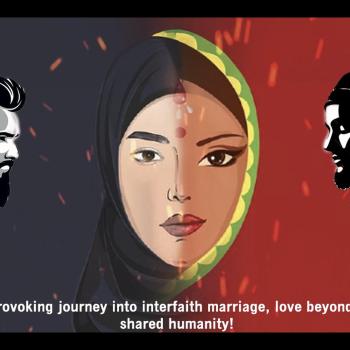DAVID: They started out with some concerns very close to home, but they've become world citizens. That's a pretty surprising transition for four guys from Dublin.
GREG: The four did grow up in Dublin. Ireland was what they knew. But they soon had some powerful experiences of the world. Particularly, Bono traveled to Central America and Africa. In Ethiopia, he had a father hand him a starving child and tell him: "Take him home with you, please. If he stays here, he will die." That's powerful stuff. Their consciousness expanded so greatly that they came to see the whole world needs help -- not just the people in Ireland.
DAVID: Is this spiritual mission we're talking an effort by the entire U2 band? Or is this really Bono we're talking about in terms of these spiritual commitments?
GREG: That's a cool question and difficult to answer. From years of following U2 and from my research for this new book, I would say: Bono is the point person, but he is representing the band in concerns they share. When we look at the benefit concerts they do -- or the benefit tour they did for Amnesty International -- you can see this is a thrust they're making together. It's like they're part of a family and they make these efforts together. Here in America recently, the guitar player The Edge partnered with Gibson guitars to help get instruments back into the hands of musicians along the Gulf Coast who lost their instruments in the big hurricane. So, the whole band obviously cares about these issues.
DAVID: With so much music released over the years, what albums would you suggest that newcomers pick up to familiarize themselves with U2?
GREG: The obvious and perhaps the easiest answer is to get one of the Best Of albums. If you listen to some of the music from early to mid career, a lot of people will say: "Ohhh, that song is by U2?" Another good first choice is All That You Can't Leave Behind. This is the album that came out in October of 2001.
DAVID: Rolling Stone called it the band's "third masterpiece." Joshua Tree and Achtung Baby were the first two in Rolling Stone's list.
GREG: This is the album associated with many of the things we were dealing with after 9/11. Then, early the following year, they performed at the Super Bowl. So that album is a good choice. But I also recommend the new album, No Line on the Horizon, because it's as intentionally spiritual as anything they've ever written.
DAVID: In Part 1 of this U2 story, we shared some of the words from a song on that new album, "Cedars of Lebanon." The song warns people to "choose your enemies carefully, ‘cause they will define you."
GREG: Yes, they're warning that we can be defined by our hatred. The album has allusions to the Middle East adventures of Great Britain and America. U2 has been standing up against practices like torture and rendition that are just now coming to light more fully. In a very real sense, they're saying that your enemies will define you. You've got to be cautious about how you combat evil -- because it can make you evil yourself.
DAVID: They seem to be stepping into the classic tradition of the ancient Hebrew prophets -- these courageous figures who stood up to powerful figures and called for justice and a return to basic religious values.
GREG: One of the sections of my book deals with the tradition of prophetic voices and I take a look at the idea of "prophetic" as not referring to "predicting the future," which is a definition a lot of people know from popular culture, but "prophetic voice" as a phrase really describing someone who speaks truth to power. For Bono and U2, this isn't about religious propositions or orthodoxy -- it's about deep spiritual truths like standing in solidarity with the poor. Bono describes what he is doing now as serving as a lobbyist for the poor.
DAVID: You've traveled widely, Greg. You've heard many of the world's great preachers -- yet your book explains that you've been profoundly moved, over many years, by the spiritual messages preached by this rock band.
GREG: I wrote this book because I do have a profound personal connection with the band. And it's not just that I sat down with them for an interview 27 years ago. It's because their music and their lives have shown up in my life over and over again. All the work I have done in writing and teaching about religion and culture has grown out of this kind of experience. U2 is one way that many people feel God moving in their lives. For so many people, they don't feel it in organized religion but in experiences like turning on the radio and hearing a song they desperately needed to hear at that moment. I have a passion for this particular book and this group -- because these musicians have set out on an authentic spiritual quest and have told the world about it honestly. They are reaching out to millions through their music -- letting us know we are not alone in our journeys.
This article was originally published at Read The Spirit.
David Crumm is an author, journalist, and filmmaker with more than twenty years experience as a Religion Writer for the Detroit Free Press, Knight-Ridder newspapers, and Gannett. Crumm is now the Editor of ReadTheSpirit - a new online home for important voices in religion and spirituality.




